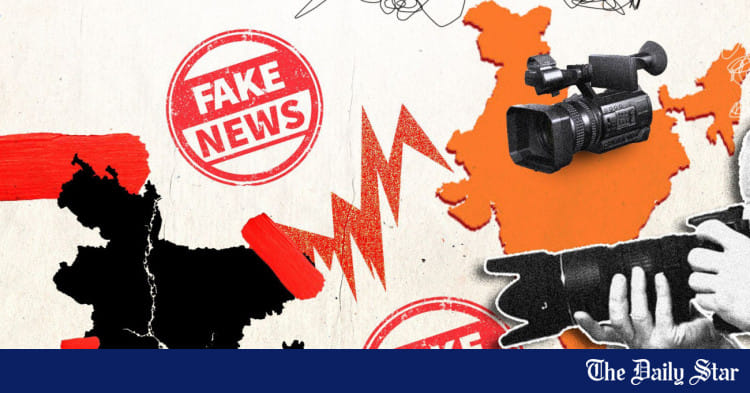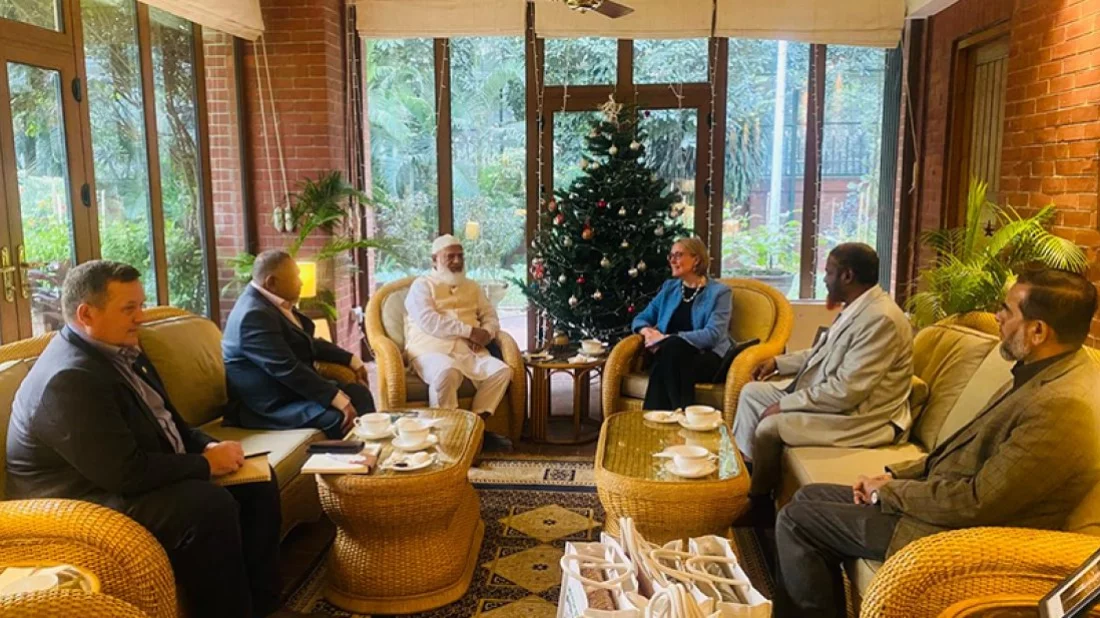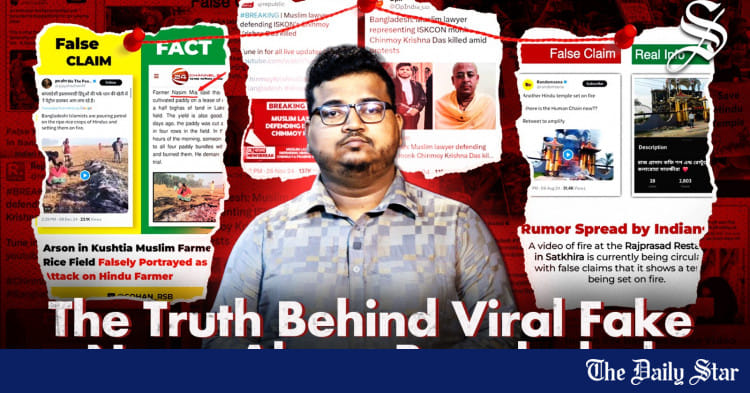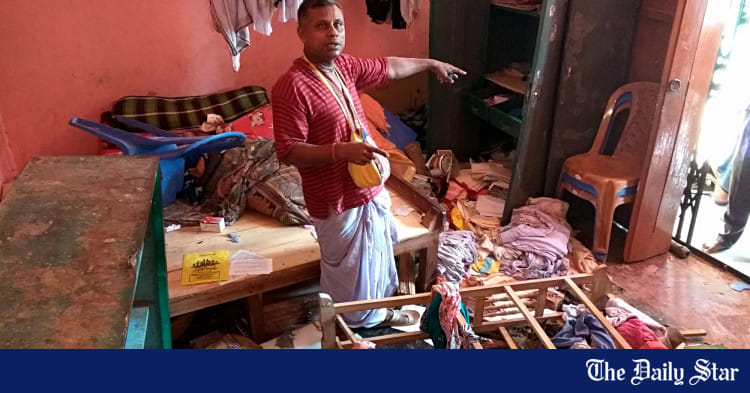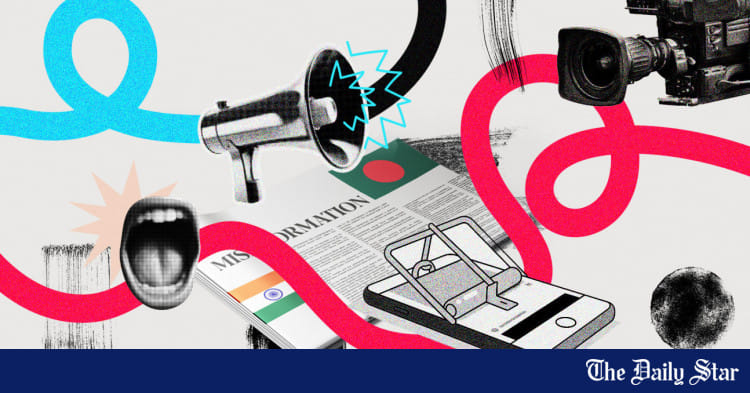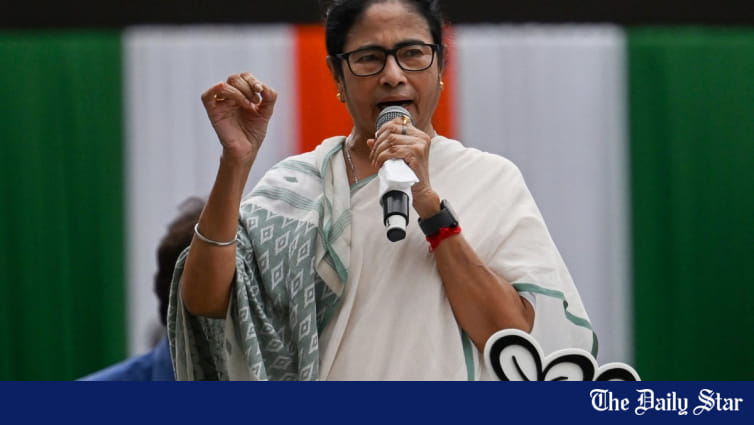- Copy to clipboard
- Thread starter
- #46

India's policy on reliance on AL and politics of disinformation
In diplomatic relations, all sovereign nations maintain the Vienna Convention on Diplomatic Relations, 1961, which is globally recognised and legally binding. The convention states in its verse No. 3 under the article no. 5 that a head of mission or any member of the diplomatic staff of the...
India's policy on reliance on AL and politics of disinformation
Saimum Parvez
Updated: 06 Dec 2024, 19: 40

Indian policymakers should keep in mind that only Awami League or Sheikh Hasina does not represent Bangladesh. Prothom Alo
In diplomatic relations, all sovereign nations maintain the Vienna Convention on Diplomatic Relations, 1961, which is globally recognised and legally binding. The convention states in its verse No. 3 under the article no. 5 that a head of mission or any member of the diplomatic staff of the mission may act as representative of the sending state to any international organisation.
Besides, its article no. 22 noted that the premises of the mission shall be inviolable. The agents of the receiving state may not enter them, except with the consent of the head of the mission .The mission premises, their furnishings and other property thereon and the means of transport of the mission shall be immune from search, requisition, attachment or execution.
The recent attack and vandalism on the Bangladesh assistant high commission in Agartala of India is a blatant violation of the above mentioned articles. The Vienna Convention has been violated through the failure of the Indian government to prevent the attack and ensure the security of the Bangladeshi diplomatic mission.
Moreover, West Bengal chief minister Mamata Banerjee urged the union government to take steps for the deployment of the UN peacekeeping force in Bangladesh. Anti-Bangladesh protests took place at places in India, where the effigies of Bangladesh chief adviser Dr Muhamma Yunus were burnt. There were protests even near the border.
Against this backdrop, it is necessary to analyse the reasons behind the rise of anti-Bangladesh sentiment and the uncourteous behaviour by the Indian politicians.
Since the fall of the Sheikh Hasina regime on 5 August, different Indian media outlets and social media accounts have been disseminating exaggerated or false narratives about events in Bangladesh.
Republic Bangla, a news channel, outperformed all others in terms of spreading propaganda. On 12 November, its host Mayukh Ranjan Ghosh raised a demand for annexing the Chattogram area to India. The channel also spread rumors that Indian satellite channels were banned in Bangladesh and that Pakistani warships had arrived at the Chattogram port.
In another instance of fictitious and fake news, a platform called Calcutta News spread rumour that Bangladesh is building an airbase near the Chicken Neck area in collaboration with China.
In addition to mainstream media, disinformation was spread on different social media platforms, particularly on X. According to fact-checking site dismislab, an X account named Baba Banaras spread a fake claim that 50 Hindus were killed and six Hindu women were kidnapped during army raids in Chattogram. Like Baba Banaras, there are numerous accounts on X, Facebook, Instagram, TikTok, and Telegram that are trying to spin false narratives by spreading disinformation.
The Indian Express, Hindustan Times, and many other Indian news outlets and social media accounts spread disinformation by claiming Saiful Islam, a lawyer who was slain on 26 November, as the lawyer of Chinmoy Krishna Das Brahmachari.
Following the political changeover on 5 August, the incidents of attacks on Hindu homes as well as temples were sensationalised in different Indian media outlets and social media accounts, in an effort to gain political benefits. In some cases, old incidents were described as recent ones while using irrelevant footage and images.
Investigations by Deutsche Welle (7 August, 2024) and BBC Bangla (11 August, 2024) revealed that numerous false claims as well as disinformation were spread regarding attacks on temples and business outlets and incidents of torturing women, arson and murder.
These fake, exaggerated and disinformation are not only creating an environment of hatred but also undermining the credibility of real incidents. India tops among the countries with risks of fake and disinformation.
The disinformation over Bangladesh is apparently impacting the politicians, civil society and the people in India. The statement from the West Bengal chief minister and the attack on the assistant high commission is the consequences of the hatred. Reports with roots in disinformation are not only reaching the Indian politicians and the masses, but also misleading lawmakers in many other countries across the world.
The influence of Awami League and Sheikh Hasina in India’s policy on Bangladesh has emerged as a major setback to improve bilateral relationship. Unfortunately, it was seen that India not only sheltered Sheikh Hasina, but also clung to her narratives. Those who decide the foreign policy in India should understand that the people of Bangladesh overthrew the Sheikh Hasina regime through a spontaneous uprising.
The narratives of Sheikh Hasina and Awami League are now contradictory to the people’s aspirations. Therefore, India will never be able to develop a good relationship with Bangladesh on the basis of a foreign policy which is rooted in friendship with the Awami League. Rather than putting all eggs in a single basket, India should try to develop ties with the political parties and civil society of Bangladesh.
Those who formulate India's foreign policy must remember that an unstable and anti-India Bangladesh is not beneficial for India's own geopolitics.
The Awami League or Sheikh Hasina does not represent all of Bangladesh. Rather, Bangladesh is a vast, diverse, and pluralistic country, home to people with various political beliefs. Relying solely on one political party is not only dangerous but also an example of an illogical, passive, and ineffective foreign policy.
If incidents of violence or minority persecution occur within Bangladesh, India has the right to protest and condemn them according to international law. However, interference in Bangladesh's internal matters, attacks on embassies, or thoughtless comments like sending UN peacekeepers will only escalate the tensions between the two countries.
Indian politicians should also remember that minorities in their own country are not faring well. Incidents of persecution and violence against Sikhs, Christians, Muslims, and Dalits, as well as attacks on mosques, temples, and churches, are increasing in India. Human rights violations against Muslims in Kashmir and Christians in Manipur have been highlighted by global media. If Bangladesh responds internationally to such incidents, as India has done, would this be desirable for India?
In India's political game for votes, Bangladesh should not be treated as a pawn. Rather, India should move away from its dependence on the Awami League and make its Bangladesh policy more Bangladesh-centric. The foundation of bilateral relations should be mutual trust, friendship, and equality.
* Dr Saimum Parvez is a teacher of political communications at Germany's DW Academy and Bonn Rhein-Sieg University
Saimum Parvez
Updated: 06 Dec 2024, 19: 40
Indian policymakers should keep in mind that only Awami League or Sheikh Hasina does not represent Bangladesh. Prothom Alo
In diplomatic relations, all sovereign nations maintain the Vienna Convention on Diplomatic Relations, 1961, which is globally recognised and legally binding. The convention states in its verse No. 3 under the article no. 5 that a head of mission or any member of the diplomatic staff of the mission may act as representative of the sending state to any international organisation.
Besides, its article no. 22 noted that the premises of the mission shall be inviolable. The agents of the receiving state may not enter them, except with the consent of the head of the mission .The mission premises, their furnishings and other property thereon and the means of transport of the mission shall be immune from search, requisition, attachment or execution.
The recent attack and vandalism on the Bangladesh assistant high commission in Agartala of India is a blatant violation of the above mentioned articles. The Vienna Convention has been violated through the failure of the Indian government to prevent the attack and ensure the security of the Bangladeshi diplomatic mission.
Moreover, West Bengal chief minister Mamata Banerjee urged the union government to take steps for the deployment of the UN peacekeeping force in Bangladesh. Anti-Bangladesh protests took place at places in India, where the effigies of Bangladesh chief adviser Dr Muhamma Yunus were burnt. There were protests even near the border.
Against this backdrop, it is necessary to analyse the reasons behind the rise of anti-Bangladesh sentiment and the uncourteous behaviour by the Indian politicians.
Since the fall of the Sheikh Hasina regime on 5 August, different Indian media outlets and social media accounts have been disseminating exaggerated or false narratives about events in Bangladesh.
Republic Bangla, a news channel, outperformed all others in terms of spreading propaganda. On 12 November, its host Mayukh Ranjan Ghosh raised a demand for annexing the Chattogram area to India. The channel also spread rumors that Indian satellite channels were banned in Bangladesh and that Pakistani warships had arrived at the Chattogram port.
In another instance of fictitious and fake news, a platform called Calcutta News spread rumour that Bangladesh is building an airbase near the Chicken Neck area in collaboration with China.
In addition to mainstream media, disinformation was spread on different social media platforms, particularly on X. According to fact-checking site dismislab, an X account named Baba Banaras spread a fake claim that 50 Hindus were killed and six Hindu women were kidnapped during army raids in Chattogram. Like Baba Banaras, there are numerous accounts on X, Facebook, Instagram, TikTok, and Telegram that are trying to spin false narratives by spreading disinformation.
The Indian Express, Hindustan Times, and many other Indian news outlets and social media accounts spread disinformation by claiming Saiful Islam, a lawyer who was slain on 26 November, as the lawyer of Chinmoy Krishna Das Brahmachari.
Following the political changeover on 5 August, the incidents of attacks on Hindu homes as well as temples were sensationalised in different Indian media outlets and social media accounts, in an effort to gain political benefits. In some cases, old incidents were described as recent ones while using irrelevant footage and images.
Investigations by Deutsche Welle (7 August, 2024) and BBC Bangla (11 August, 2024) revealed that numerous false claims as well as disinformation were spread regarding attacks on temples and business outlets and incidents of torturing women, arson and murder.
These fake, exaggerated and disinformation are not only creating an environment of hatred but also undermining the credibility of real incidents. India tops among the countries with risks of fake and disinformation.
The disinformation over Bangladesh is apparently impacting the politicians, civil society and the people in India. The statement from the West Bengal chief minister and the attack on the assistant high commission is the consequences of the hatred. Reports with roots in disinformation are not only reaching the Indian politicians and the masses, but also misleading lawmakers in many other countries across the world.
The influence of Awami League and Sheikh Hasina in India’s policy on Bangladesh has emerged as a major setback to improve bilateral relationship. Unfortunately, it was seen that India not only sheltered Sheikh Hasina, but also clung to her narratives. Those who decide the foreign policy in India should understand that the people of Bangladesh overthrew the Sheikh Hasina regime through a spontaneous uprising.
The narratives of Sheikh Hasina and Awami League are now contradictory to the people’s aspirations. Therefore, India will never be able to develop a good relationship with Bangladesh on the basis of a foreign policy which is rooted in friendship with the Awami League. Rather than putting all eggs in a single basket, India should try to develop ties with the political parties and civil society of Bangladesh.
Those who formulate India's foreign policy must remember that an unstable and anti-India Bangladesh is not beneficial for India's own geopolitics.
The Awami League or Sheikh Hasina does not represent all of Bangladesh. Rather, Bangladesh is a vast, diverse, and pluralistic country, home to people with various political beliefs. Relying solely on one political party is not only dangerous but also an example of an illogical, passive, and ineffective foreign policy.
If incidents of violence or minority persecution occur within Bangladesh, India has the right to protest and condemn them according to international law. However, interference in Bangladesh's internal matters, attacks on embassies, or thoughtless comments like sending UN peacekeepers will only escalate the tensions between the two countries.
Indian politicians should also remember that minorities in their own country are not faring well. Incidents of persecution and violence against Sikhs, Christians, Muslims, and Dalits, as well as attacks on mosques, temples, and churches, are increasing in India. Human rights violations against Muslims in Kashmir and Christians in Manipur have been highlighted by global media. If Bangladesh responds internationally to such incidents, as India has done, would this be desirable for India?
In India's political game for votes, Bangladesh should not be treated as a pawn. Rather, India should move away from its dependence on the Awami League and make its Bangladesh policy more Bangladesh-centric. The foundation of bilateral relations should be mutual trust, friendship, and equality.
* Dr Saimum Parvez is a teacher of political communications at Germany's DW Academy and Bonn Rhein-Sieg University



